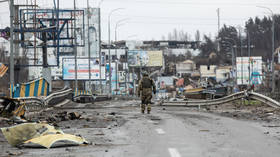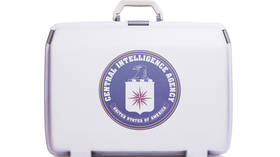Phone call records shed light on what happened near Kiev
Looking for Russian atrocities alleged by Ukraine, Kiev’s security officials and Western journalists find something else
Ukrainian security officials and Western journalists who went looking for Russian atrocities northwest of Bucha in the Kiev region found no signs of human rights abuses, according to phone call records obtained by RT. Instead, locals told journalists the Russian troops gave them food and treated them well. Meanwhile, a Ukrainian official complained that his own side’s militia looted everything.
In a series of satellite phone calls, a reporter identified only as “Simon” tells his colleagues he visited Borodyanka – a town about 25 kilometers northwest of Bucha – and “there’s no bodies in the streets at all,” contrary to what he was led to expect.
The town has been “shelled to pieces,” Simon says, “but there’s no evidence of any rights abuses here at all.” In fact, he and his crew interviewed multiple residents who said the Russian troops had been very friendly and gave them food and water and other supplies. “And we got quotes on camera for that,” he adds.
“I don’t know what the prosecutor was talking about, but we have seen nothing like that, at all. It’s a completely different picture,” Simon tells his colleagues. One French journalist may have seen a body of someone killed by shelling, but “no executions.”
The correspondent ends the call by saying he was going back to Bucha, to “try and find some more evidence of extrajudicial killings there, but there’s no sign of any of that here.”
Ukraine has accused Russia of murdering over 400 civilians in Bucha before retreating from the town near Kiev last week. The US and its allies have accepted Kiev’s claims uncritically, citing them to impose more sanctions against Russia. Moscow has categorically denied the accusations, however, saying that Russian troops pulled out of the town on March 30, and that claims of killings appeared only four days later – after Ukrainian security forces and TV cameras arrived in town.
Another intercepted call, between two Ukrainian Security Service (SBU) officials, revealed the situation in Kukhari, a town about 60 kilometers northwest of Bucha – and it, too, clashes with the prevailing media narrative coming from Kiev and the NATO capitals.
“From March 24 to April 3, after we pushed the ‘orcs’ away from here,” says a SBU official identified only as Sergey Anatolyevich, speaking to someone named Lesogor and using the Ukrainian derogatory term for Russians. “After the unit that pushed them out moved on, the territorial defense came from Malin … and marauded during that time. Looted everything they could. Broke down doors, everything. Safes were opened, cars were stolen. They stuffed the cars with everything worth anything and took it away,” he adds.
“It turns out the ‘Moskals’ took nothing, but ours went in and looted everything,” Sergey Anatolyevich adds, using another derogatory term for Russians. Malin is a nearby town southwest of Kukhari, held by the Ukrainian military.
When Lesogor asks which unit was looting, the other official replies that no one really knows. “Some say Volhynian, others say someone else,” he says, referring to a region in western Ukraine.
Moscow sent troops into Ukraine on February 24, following a seven-year standoff over Kiev’s failure to implement the terms of the Minsk agreements and end the conflict with the breakaway regions of Donetsk and Lugansk. Russia ended up recognizing the two as independent states, at which point they asked for military aid.
Russia demands that Ukraine officially declare itself a neutral country that will never join the US-led NATO military bloc. Kiev insists the Russian offensive was completely unprovoked and has denied claims it was planning to retake the two Donbass republics by force.







Comments are closed.